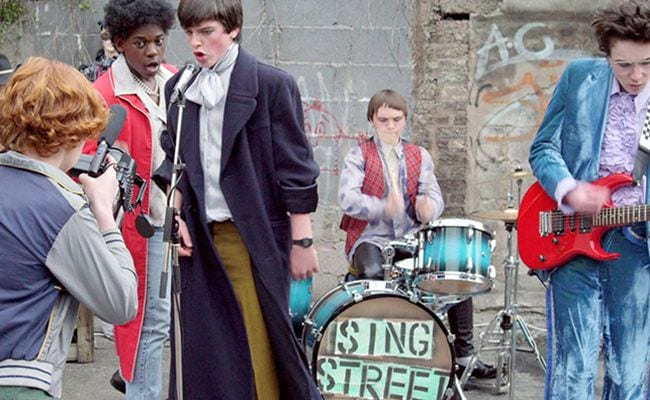
When first glimpsed in John Carney’s newest musical confection, ruddy-cheeked teenager Conor (Ferdia Walsh-Peelo) looks like the kind of kid who’s set to be chewed up and spit out by the music industry, not to mention life itself. The setting for Sing Street is Dublin, circa 1985, where the black-robed authority of the Church still rules all and the ferry to England carries more dreamers and strivers to London each day.
As the meager middle-class trappings of Conor’s life are stripped away, he’s left facing a future without much in the way of armor, or security. It’s the kind of situation that pop songs were made to cure.
Sing Street‘s first scene has Conor noodling around on a guitar in his room, while the voices of his battling parents — the sharp and underused Aidan Gillen and Maria Doyle Kennedy — screech throughout the house. He slams the door, but the voices are just as loud through the paper-thin walls. If music is going to be a shield for Conor, it’s going to have to be a strong one.
Informed that a change in family finances have dictated that he’s switching schools, Conor is startled. No more Jesuitical instruction for him, now it’ll be the Christian Brothers over on Synge Street. As Catholic boys everywhere know, the Christian Brothers focus on discipline, to put it mildly. The frequently punished student body reacts accordingly to Conor’s posh ways, making him unhappy.
It’s a rough start for a Carney film, darker and more tinged with real life than anything we saw in his gorgeously soaring fairy tales, Once and Begin Again. Here, Conor deviates from the miserable-movie-teenager playbook.
Angry at his parents, not sure what to do about that skinhead at school hassling him, Conor isn’t so mopey that he misses the chance to chat up Raphinia (Lucy Boynton) when he sees her hanging around school. When she says she wants to be a model, he makes up a story, that he just so happens to have a band and he’d love to have her be in his video.
The first part is true, the second resolutely not. But that gives Conor the excuse to run about and in a matter of days put together both a band and a video shoot. After all, what cures a dreary life better than puppy love and a catchy tune?
None of it comes with too much difficulty. For all its archival interest in the particularities of ’80s’ tune-smithing, Sing Street is no docudrama. All it takes is one sequence that feels pulled together from everything from The Blues Brothers to The Commitments (the spirit of the latter hovering over this more innocent film like a funny, drunk uncle) and presto, Conor’s got his band.
The gaggle of geeky charmers — who, as unfortunately happens in so many films like this, get mostly ignored once their origin story is established — start cycling through a roster of influences and increasingly professional tunes, from New Romantic oddity to Cure pop-gothica and finally Huey Lewis-ish power pop. Raphinia might not fall for Conor instantly, but it doesn’t take long for his ever-more assured songwriting and singing (delivered to her via cassette tapes dropped through the mail slot) to become irresistible.
Faith in the transformative power of music courses through Sing Street like an electric current. Watching Duran Duran’s “Rio” video on Top of the Pops, Conor’s admiring but hash-fogged older brother Brendan (Jack Reynor) dispenses another of his many declarations of wisdom: “What tyranny could stand up to that?” It’s partially a gag on the kind of youthful optimism about art in the pre-Internet age.
At the same time, though, Carney buys fully into it. He has, after all, based an impressive if short film career fully on that faith. Watch when Conor pops around to ask if his bandmate Eamon (Mark McKenna) wants to write a song, and the glee that flicks across Eamon’s morose, young John Cusack-like face when he shoots back, “Always,” and you will understand just about everything there is to know about teenagers and music.
Sing Street is a rougher piece of work than Carney’s previous films, which is only proper. The street buskers of Once and the session players of Begin Again were all seasoned pros. The shiver-inducing tunes they slapped together on the spot were a little too polished to be believed, of course, but given the practiced talent on display, they still resided in the realm of possibility.
Carney is smart enough about the creative process to know that he can’t have a kid like Conor, who at first can barely able to pick out a tune, suddenly coming up with “Falling Slowly”. His musical and personal evolution proceeds as it does for adolescents, joltingly and shaped by influences grabbed up just as quickly as they are discarded. With its raggedy edges and rainy conclusion, Conor’s story is an emotionally honest one.


![Call for Papers: All Things Reconsidered [MUSIC] May-August 2024](https://www.popmatters.com/wp-content/uploads/2024/04/all-things-reconsidered-call-music-may-2024-720x380.jpg)



